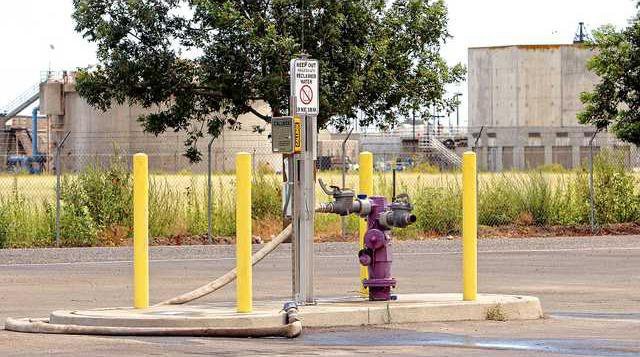What Manteca sends down its drains and toilets one day could flow through water taps in Mountain House.
That is one option of how Manteca could repurpose upwards of 10,500 acre feet of recycled wastewater it generates in a typical year.
It is one of 10 alternatives explored in the reclaimed water facilities master plan being presented to the Manteca City Council when they meet Tuesday at 7 p.m. at the Civic Center, 1001 W. Center St.
The other alternatives include:
*Four variations of meeting local demands such as at parks and the wastewater treatment plant.
*Selling water to the South San Joaquin Irrigation District.
*Two variations of delivery — direct and indirect — to the Delta-Mendota Canal for long term contracts for agricultural use.
When a previous council commissioned the master plan updated, the preferred alternative was one that would cover all potential local uses.
To do that, the infrastructure needed will cost $1,063 per acre foot of water used.
That amount is less for other local alternatives that includes what were identified as core needs at $650 per acre foot, parks and such in north Manteca plus core needs at $790 per acre foot, as well as parks and such in south Manteca plus core needs at $860 per acre foot.
The only alternative that wouldn’t cost anything to implement would be a transfer to Mountain House.
The option would allow the city’s wastewater treatment plant to have a positive cash flow from sales with no need to put infrastructure in place
The other three options for sales would require infrastructure to make them work.
A previous council dismissed the idea to sell treated wastewater as a revenue stream for the city.
The reasons all centered around making sure there was long range sustainability for Manteca’s water needs.
That was based on:
*The high probability future droughts could lead to water rationing.
*A looming state mandate requiring groundwater use to be net zero in any given 12-month period meaning there needs to be a 100 percent recharge of all water used whether it is done by natural seepage or by manmade facilities.
*The city has been requiring developers to install purple pipe to eventually serve as a recycled water delivery system as growth occurs. Those costs are passed on to the buyers of new homes as they are collapsed into the sale price.
*The potential for the state undermining SSJID water rights on the Stanislaus River in some manner in order to increase unrestricted fish flows on the Stanislaus River.
As such, the council consensus at the time was that selling Manteca’s recycled wastewater for uses outside of the city would essentially be selling Manteca’s future down the river.
The city currently uses 15,280 acre feet annually of potable water that is split almost equally between surface water from the Stanislaus River watershed secured through the SSJID and groundwater pumping.
Another 6,000 acre feet annually is taken from a higher non-potable groundwater table for irrigating parks, school grounds and farming operations within the city limits.
The city using filters and an ultraviolet process generates about 10,500 acre feet of treated wastewater a year. It is almost 100 percent is being returned to the San Joaquin River. A small amount is being sued for dust control by developers.
Once it is treated, the salinity in the recycled water is rated at 758 microsiemens per centimeter when it comes to salt content.
The threshold for sensitive agricultural application when it comes to salinity is 500, for drinking water 900, and for use in almond orchards it is 1,000.
The next and final step in the treatment process to make the water suitable for domestic costs at a significant cost.
To contact Dennis Wyatt, email dwyatt@mantecabulletin.com





